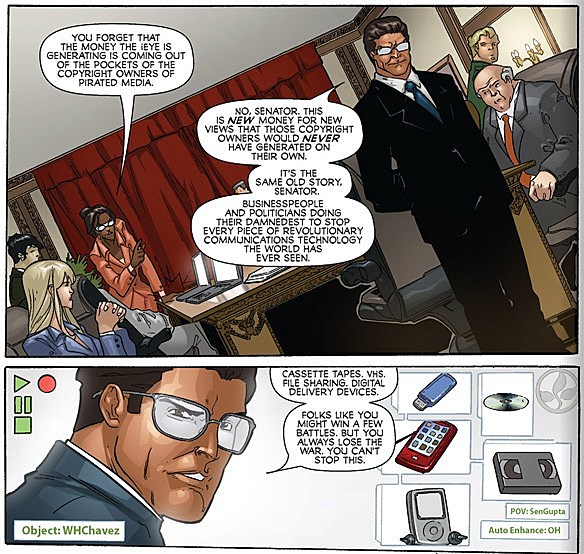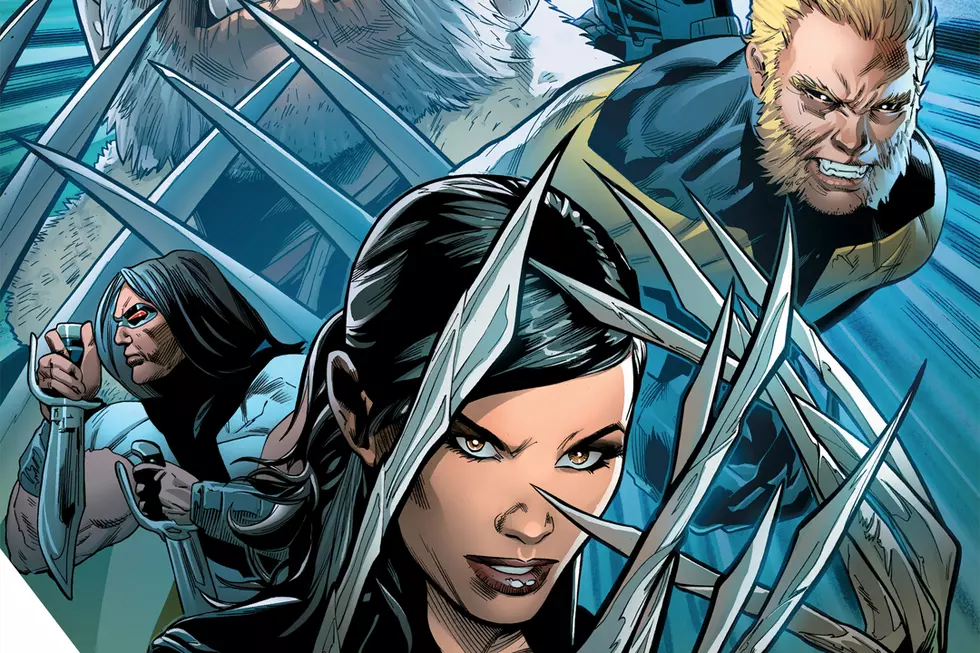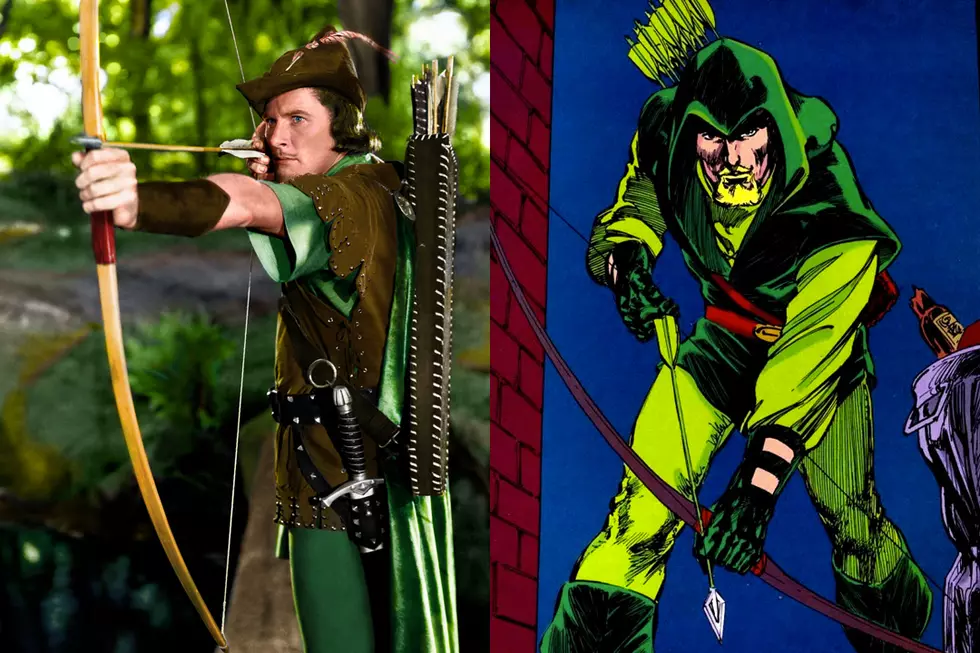![Greg Pak Talks About Giving Away His ‘Vision Machine’ Comic for Free in Digital AND Print [Exclusive Interview]](http://townsquare.media/site/622/files/2010/10/visionmachine.jpg?w=980&q=75)
Greg Pak Talks About Giving Away His ‘Vision Machine’ Comic for Free in Digital AND Print [Exclusive Interview]

One of the biggest buzz books of the past week has been "Vision Machine," a new title from "Hulk" and "Hercules" writer Greg Pak and "Jimmy Olsen" artist R.B. Silva. The first issue of the comic, which details a piece of technology called the iEye that makes its debut in 2061 and allows users to record, remix and share everything they see. With a plot that reflects the rise of digital information and its effects on both piracy and legitimate business, it shouldn't be surprising that a lot of the buzz surrounding the book has related to the fact that it's being distributed digitally for free -- available both through comiXology on the web and the iPad and as a PDF that you can download right here and distribute for free -- but today, Pak revealed another interesting piece of information.
When a fan on Twitter who enjoyed it asked where he could purchase the print version, Pak responded by saying "Digital only at the moment. We're printing a trade later in the year and distributing for FREE at fests/conventions."
That's not the only impact of doing a book under the Creative Commons license, either. If you've been paying attention to the controversies over digital rights and distribution, this is kind of a big deal, especially coming from one of comics' most prominent writers, so ComicsAlliance spoke to Pak about it to find out a little more about what he's doing.

ComicsAlliance: So if I read your Twitter feed right, you're distributing both the comic and the trade for free, in both print and digital versions?
Greg Pak: That's correct! The project was funded by the Ford Foundation, which has made it possible for us to put our money where our mouth is and release it under a Creative Commons license. Since the story deals so much with questions of copyright and free culture, this seemed like the only right way to do it.
CA: Right, and because of that license, you're also allowing other people to adapt and change the work as they see fit, as long as it's for non-commercial purposes?
GP: That's right. I'm particularly excited by the remixing/adaptation potential.
CA: What are you hoping people do with the book under the license?
GP: Well, first and foremost, I hope they share it. Email it, pass it around, upload it to their websites, share the links. We just want the book to be read by as many people as possible. Isn't that every writer's dream, after all? But the cool thing about the Creative Commons license is that it allows folks to remix the original or even spin off new stories from the original, as long as it's done non-commercially and released under the same terms as the original. I'm dying to see what comes out of that.
CA: So you're totally into my upcoming sequel, "Vision Machine 2: Vision Harder."
GP: YES! I know that after our NYCC panel, a few writers and filmmakers were talking about wanting to do something that plays in the Vision Machine world, so I'm pretty excited to see what happens.

CA: Despite the fact that it's set in 2061, there's a lot going on in the book that reflects what's going on with digital distribution now, especially with the rise of the iPad, the 1000% increase in digital comics in 2010 and the controversy over Net Neutrality. You even essentially call out Google for their "don't be evil" policy that drew a lot of attention when it came out that they were making a deal with Verizon. I know it's a big question, but how do you feel these things relate to what's going on in comics right now?
GP: It's kind of nuts, because I wrote the first draft of "Vision Machine" #1 over a year ago, but everything we hint at in the book just becomes more relevant every single day. The fictional head of Sprout Computers in "Vision Machine" is now tweeting at @sproutboss , and it's kind of astounding the way the daily news coming over her twitter feed resonates so much with what's happening in the book.
Regarding comics specifically, I think it's relevant because every time there's new technology, there are new ways to lose money via pirating... and incredible new ways to build audience by seizing the bull by the horns. I'm not going to pretend that I have all or any of the answers, but we're doing our best with "Vision Machine" to tell a story that's entirely plausible given trends and technologies we're seeing today. Folks can then make of that story what they will. We had a fantastic discussion at our NYCC panel about the big questions of creativity, society, piracy, and privacy brought up by Sprout Computers' crazy new iEye.
If the story can continue to inspire that kind of reflection and discussion, I'll be thrilled.
CA: I don't want to ascribe too much of what goes on in "Vision Machine" to being your personal views, but you've created this world in which the people generating content on their own are also reaping all the monetary benefits, which totally seems like a utopia for anyone who has created web content. Do you think that's something that's possible for comics and comics creators?

GP: Yes! That part of the book is a bit of wild wish fulfillment, to imagine a world in which genuinely independent media can seamlessly find its audience and creators can be rewarded for their contributions. And yes, I do think that's an entirely achievable utopia.
I mentioned at the panel that my craziest dream is for a little box that sits on your desk. And when you see something on the internets that you dig, you can drop your loose change into that box. And your loose change will be teleported away and deposited in the accounts of the creators who deserve it. That particular scenario relies upon technology that may never exist, but eventually someone will come up with a way for people to shift very tiny amounts of money that cumulatively will turn into tangible rewards for creators.
CA: I remember Scott McCloud talking about something like that years ago. Micropayments?
GP: Exactly. Now there are real reasons why this may never actually come into existence on the scale I'm envisioning. As a smart person pointed out to me after the NYCC panel, it's hard to make a 5 cent deposit to someone's bank account when the bank charges 10 cents for the transaction. But very smart people are attacking this issue from multiple angles even as we speak.
Actually, in "Vision Machine" #3 we posit a scenario that addresses a lot of this. Guess you'll have to check it out to see what we came up with!
CA: In addition to comics, you're also a filmmaker, and over the past few years, I'm sure you've taken notice of stuff like Hulu and Netflix Instant, where companies are trying to figure out how to make their content available online but still make money off of it. Now, we're sort of seeing the same thing again with comics, especially since the iPad. How do you think digital comics are being handled? Can they learn anything from other media?
GP: I'm very excited with everything that's happening with digital comics. The iPad is indeed a game changer, and the companies are coming through step by step with great apps and programs. My big dream is that it will continue to get easier and easier to buy comics on the iPad and that the audience can actually grow to support more books and more creators. In the long run, we'll benefit from even more seamless linking, so that you can directly link from a web page or a tweet to a comic book's sale page inside an iPad app. I could be wrong, but right now I believe you can link to the app, but not to an individual piece of content inside it.
CA: What about price points? We're already seeing Dark Horse announce that they're going to go down to $1.49, DC's doing some things at 99 cents, and I heard that Marvel's rollback to $2.99 for print comics is being supported at least in part by their success selling digital copies at $1.99. There are even independent guys like ["Atomic Robo" writer] Brian Clevinger who have adapted the 99-cent issue/discounted "bundle" option that we've seen from MP3s. Do you think there's a magic number that'll keep everyone happy?
GP: I don't know. Different books probably can sell at different price points and do great -- it'll be up to each publisher or creator to figure out what works for his or her own books.

CA: How do you feel about the resistance some creators have to essentially "giving away" their work online? There was the thing not too long ago with Sergio Aragones objecting to the idea, but you're actually doing it: distributing both in print and digitally for free.
GP: Again, it's entirely the prerogative of each creator to figure out what works for him or her. With "Vision Machine," I have a fantastic opportunity to experiment with giving it all away. That's not something I've yet considered for most of my other creator-owned film and comics work. I have uploaded a number of shorts to my Pakbuzz Youtube channel, but those aren't being released like "Vision Machine" under a Creative Commons license.
It's an evolving world and I'm learning as I go, just like everyone else.
CA: Any other thoughts on "Vision Machine" so far?
GP: I'd just love to plug the creative team and Shon Bury of Space Goat. RB Silva, who's becoming well known for his beloved Jimmy Olsen strip, is penciling. RB's phenomenal -- and his art gets better with every successive page in the book. I just did lettering tweaks for issue #2, and it's just gorgeous what he's doing there. And of course, huge thanks to Orlando Bagwell of the Ford Foundation for coming to me in the first place.
OH! AND HOW COULD I FORGET! We're going to have a letters page in "Vision Machine" #2, so send your letters to vm@pakbuzz.com with "OKAY TO PRINT" in the email. Sprout CEO Liz Evers will also be answering questions on the letters page, so feel free to address your letter to her, if you like!
CA: Do you have a title for it yet?
GP: NO! Twitter me @gregpak if you have suggestions!
More From ComicsAlliance
![Marvel’s Merry Mutants Undergo A RessurXion In ‘X-Men Prime’ #1 [Preview]](http://townsquare.media/site/622/files/2017/03/X-Men_0.png?w=980&q=75)




![DC Reveals Art And New Details For ‘Kamandi Challenge’ Tribute To Kirby [NYCC 2016]](http://townsquare.media/site/622/files/2016/10/Kamandi00.jpg?w=980&q=75)

![Ryan K. Lindsay Grabs ‘Deer Editor’ by the Horns [Back Pages]](http://townsquare.media/site/622/files/2016/08/deereditor-fea.png?w=980&q=75)

